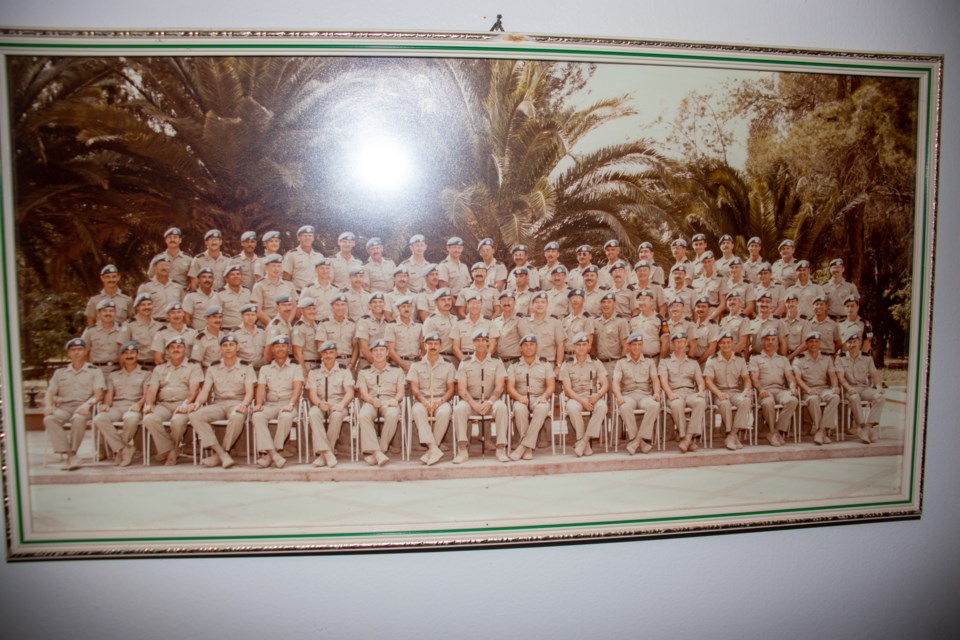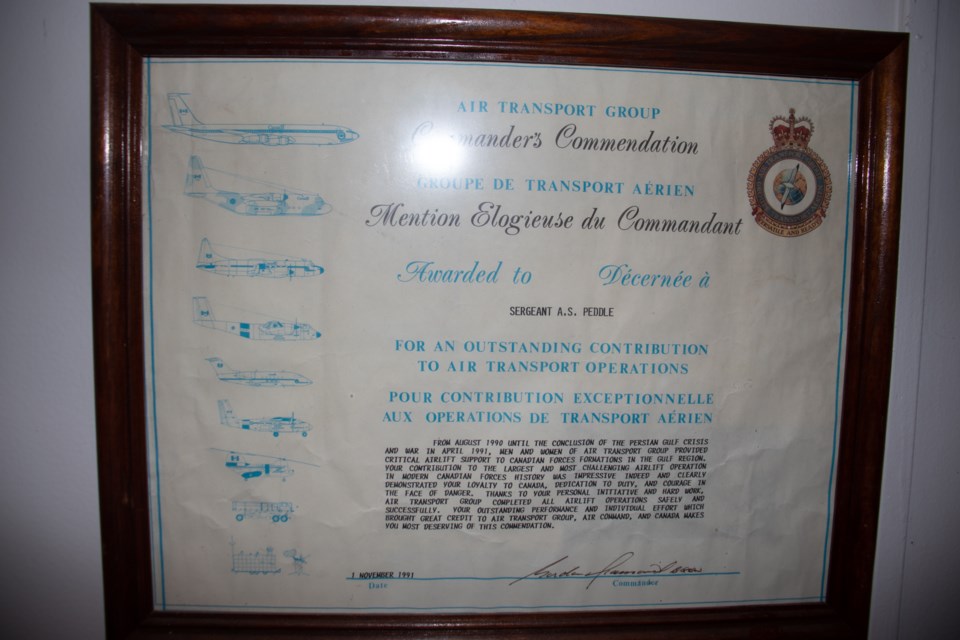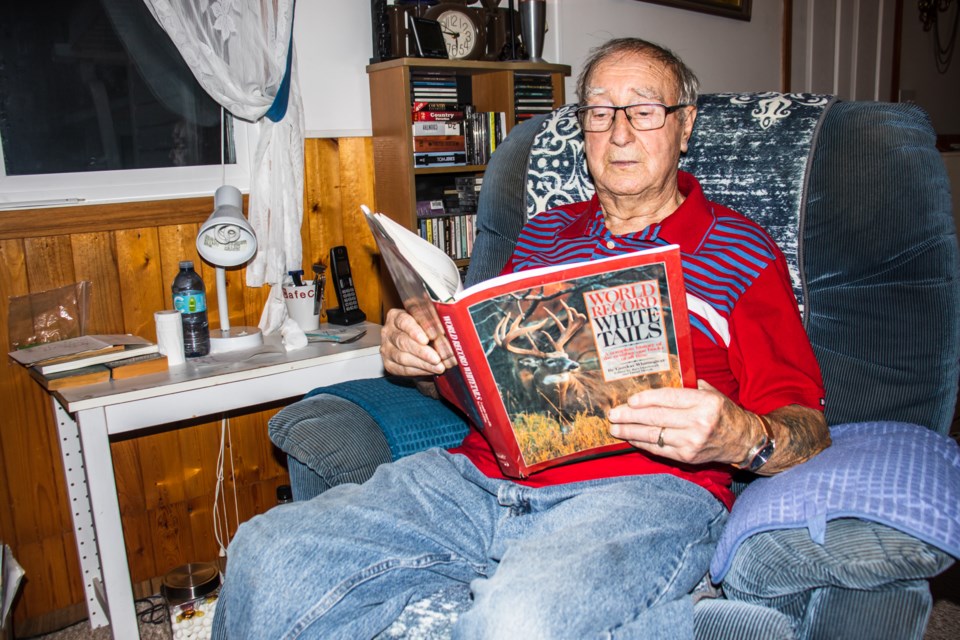ASHMONT – To be a peacekeeper is to stand in the gap between sides that are ready to clash, hoping that your presence alone can keep a fragile peace intact.
Albert Peddle, an 86-year-old veteran from Ashmont served in the Canadian military for 32 years – much of his service being a peacekeeper.
Peddle joined the Royal Canadian Army Service Corps in March 1960, before going to West Germany for his first deployment in 1962 for three years.
West Germany
The deployment was part of Canada’s pledge to support the North Atlantic Treaty Organization (NATO) to help ensure forces were ready should conflict erupt.
With the Cold War intensifying, NATO considered Western Europe a likely front for potential conflict.
“I can remember . . . when I’m down in trench. [It was] colder than hell in the morning,” he says with a wry smile. “All night, waiting for dawn, playing war games, you know?”
These exercises were designed to keep soldiers sharp and ready, yet they brought their own moments of unexpected irony, he said. “Later in the morning, when it got light, I’d see people walking through . . . just picking mushrooms,” he says with a chuckle, explaining that as they were all dug in, serious as anything, locals would be gathering mushrooms like it was any other day.
But that is exactly what Peddle wanted to protect. “All the time we were there to keep the peace,” he added, before pausing as if to recall something.
When he spoke again, he mentioned that during his deployment, he saw the scars of the second world war etched across Germany’s landscape.
“All the train stations, the buildings – they were still blown up . . . nobody had fixed them up,” he murmured. “There were places you could go where . . . you’d see where they killed all those people.”
Cyprus
Following his deployment in Germany, he was deployed for peacekeeping missions in Cyprus for six months. “I was a sergeant over there,” he said.
“They cut the island in half. One side went to the Turkish, and the other to Greeks. We were peacekeeping, but there was always that sense of division.”
Cyprus had been split between the Greek and Turkish Cypriot forces, Cyprus’ ethnic populations, dividing the island into separate Greek and Turkish territories, according to information from the Government of Canada.
The United Nations sent peacekeepers to manage the situation, and Canada answered the call with Operation SNOWGOOSE, a mission that continues to this day.
Canadian forces were stationed in strategic locations, including a large hotel split down the middle between the two territories. “There was this hotel, right in the middle,” he said, where Greek and Turkish forces couldn’t stay. “So, we took it over. A lot of our guys stayed there.”
But even the hotel, which served as a neutral ground, was not immune to the dangers. “Some guys were shot just by being on the deck,” he said.
Cyprus was an example of the delicate balance peacekeepers must tread, according to Peddle. For example, there was one incident when the Turkish and Greek Cypriots shot at each other.
He said a Canadian colonel walked directly between the two opposing forces, amid the flying bullets, shouting for both sides to stop. “They didn't want to shoot Canadians because Canadians are peacekeeping for both sides,” he said.
Peddle’s responsibilities also included keeping an eye on the island’s only operational airport at the time. A heavily fortified zone where forces from multiple countries converged. “All the planes from all over the world landed there – didn’t matter where they were from,” he recalled.
The airport was encircled with barbed wire and guarded by soldiers with tanks and machine guns. He recalled when a plane from another country arrived, carrying several men under guard. “They took them off the plane and marched them out,” only about 200 feet away from him, he recounted. “And right there on the tarmac, they shot them. Just like that.”
While his stay in Cyprus may have been short, it was a reminder about the dangers at play in missions to keep the peace. “Our guns were always loaded,” he said. “There was no telling what could happen.”
“You got to be there watching all this stuff. You don't know who's who. You don't know if they're from the base or terrorists coming in,” said Peddle.

Persian Gulf War
Peddle’s last chapter in the military was back in 1990 during the Persian Gulf War. Canada joined a coalition responding to Iraq’s invasion of Kuwait with Operation FRICTION.
From August 1990 through April 1991, Peddle was part of the Air Command’s Transport Group that supported Canadian forces in the war with personnel and cargo transport using a fleet of 27 CC-130 Hercules and five CC-137 Boeing 707, which carried out extensive missions to deliver personnel, equipment, and supplies across hostile territories.
The Gulf War ended with Iraq’s defeat through the coalition’s Operation Desert Storm.
His work during the Gulf War earned him a Commander’s Commendation for an outstanding contribution to air transport operations.
Peddle retired in 1992.
Paying respect to all the peacekeepers who serve and have served in the past just like him, Peddle said it is not an easy job. “A lot of people get killed peacekeeping,” he said.
Peacekeeping, for him, means stepping into places charged with tension and hoping, each time, to return home.




